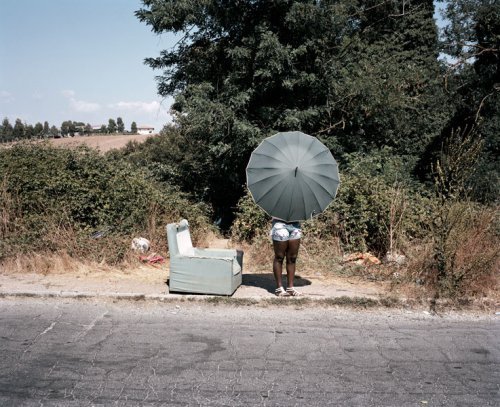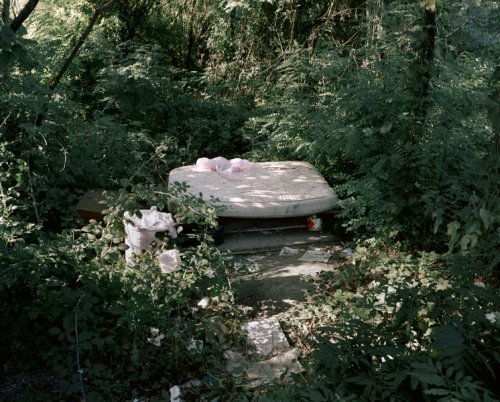Sean Jacobs's Blog, page 547
March 24, 2012
Paolo Patrizi's photographs of 'shrines to the shortcomings of globalization'
Italian photographer Paolo Patrizi says about his work on the "Italos":
I used landscape shots to capture the phenomenon of Nigerian prostitution in Italy. My photographs contain the signs left behind by cars, waiting times and customers' transactions. What emerges is a sub-human condition these women live daily. Some appear as if tricked by the idea that one day their prostitution status will be made legal. I have tried to deliver the emotion and the atmosphere of the eerie places I visited, thus allowing the viewer a glimpse of the littered makeshift sex-camps [...] pits of dirt and abuse, shrines to the shortcomings of globalization.
You'll find Patrizi's full series here. (For more background on 'The Italian-Nigerian Connection': Orlando von Einsiedel's documentary on the topic is informative: part I and II.)








March 23, 2012
Friday Bonus Music Break
Five for the weekend. I haven't done this in a while. First up Philadelphians Chill Moody (rapper) and Cody Kahmar with the music video for "My Eyes":
Malfred's reggae homage to Tanzanian mothers, "Asante Mama":
Staying in East Africa, here's new music from Uganda's Maurice Kirya:
The Mexican-Ethiopian rapper Gonjasufi's video for "The Blame":
And finally, any week of music breaks I'm involved in won't be complete without some Nigerian-American pop:








They talk a lot. Let them talk.
That first line is one by Tunde Adebimpe (joined by fellow TV on the Radio musician Kyp Malone) from his collaboration with Amadou & Mariam on 'Wily Kataso'. The second line is the title of Spoek Mathambo's latest single (and music video):
It has been an interesting week. Not just talking music.








Mali's coup—first thoughts
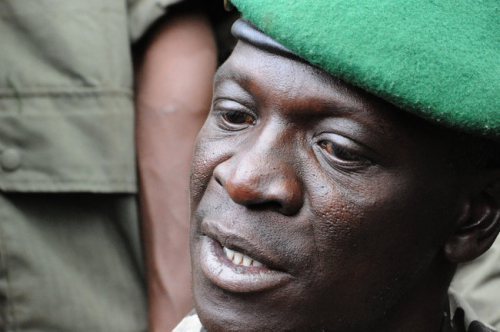
Gregory Mann, associate professor of history at Columbia University in New York City,* writes a guest post for Africa is a Country on the coup in Mali:
They say no press is bad press. False. When Mali makes the papers, it's usually for the best reasons — Oumou Sangaré, Tinariwen, or Amadou and Miriam are coming to town. Lately, it's for the worst — rebel attacks in the North, a mutiny, and now a coup.
The dust hasn't settled yet, and no one knows which way the wind is really blowing, but a few things are worth saying about the mutiny and the coup that rocked Bamako over the last few days. Even in a hazy moment, a few things can be clear.
First, don't believe the hype. The junta says they want to restore democracy. Bogus. Democracy in Mali is in pretty good shape, all things considered (i.e., bearing in mind that the central government has effectively no control over the northern half of the country). Presidential elections were planned for next month, and everyone expected them to go forward.
The coup was not intended to secure democracy, but to prevent it. If the people were to go to the polls in April and elect a new president, whoever won would be seen as legitimate, both at home and abroad. If there was going to be a coup, it had to be now. Better (and easier) to topple an increasingly unpopular incumbent than a newly elected president. They were running out of time. That's why in addition to members of the current government, the junta locked up some of the candidates.
There is a rumor that ATT (Amadou Toumani Touré) — the popularly elected incumbent — was going to stage a 'coup from above' and hang on to office in spite of the fact that his constitutionally mandated second term was up. That rumor has been around since before "Barack Obama" became a household name. It's categorically false. ATT has been ready to go for some time now — both his critics and his partisans recognize that he's tired, and he has already given up power once, in 1992, before being elected in 2002.
Second, don't believe the other hype. The Foreign Minister of France, the former colonial power, came out early to condemn the coup and to call for rapid elections. Sounds good, doesn't it? Except the elections were already scheduled and the campaign underway. The coup on the other hand, was not yet settled — so why treat it as a fait accompli? France — which will take the lead in the European response — is no neutral actor here, even if it's hard to know what game it is playing. The more cautious African Union and American responses — condemning violence, seeking consultation — are deliberately tepid, but justified, and they don't impose a conclusion where one doesn't exist.
All that said, there are questions, too.
First, where is ATT? The word on the street in Mali — what I hear when I call people there — is that he's in the American embassy. False, say the Americans. He's at the paratroopers' base, someone in his entourage apparently told RFI. That's possible, but it's worth bearing in mind that the embassy and the base are practically next door to each other. And the Americans generally like ATT, even if they wish he were more willing to take the fight to those in the North who claim al Qaeda links or Salafist inclinations.
Second, what's the link with the rebellion in the North? Some have already said that the Tuareg nationalist rebels in the North — the MNLA — wanted to forestall national elections, or at least to preclude the possibility of elections being held in the Sahara, in order to bolster their argument that they are excluded from national political life. Like the fractured and venerable Tuareg nationalist movement from which it emerged, the MNLA is more attentive to its image than a prom queen. France is said to be a suitor, with the idea that courting Tuareg nationalists will draw them away from the Salafist splinter group (Iyad ag Ghali's Ansar Dine) that emerged alongside them in the wake of Muammar Gaddafi's fall. ATT's northern strategy of avoiding a fight even when it was brought to him would seem to partake of the same logic — better to split the movement by negotiating than to unite it by fighting it. If that was indeed his strategy, it relied on the slow expenditure of two resources he didn't really have: time (either to let events unfold or to hand over power in May) and other people's patience.
The undeniable link with the Northern rebellion is that the army was fed up with being told not to fight. To the shock of the soldiers, several garrisons in the North were lost to MNLA attacks, and some were given up without a fight. To their horror, in Anguelhoc defeated soldiers were massacred, their throats slit after being taken prisoner. This atrocity is disputed — some deny it occurred, others argue over who committed it. But the army believes it, and the soldiers' wives and widows who marched in protest last month surely played a major role in pushing their husbands — or their late husbands' comrades — to take the fight to the government if the government wouldn't let them take it to the Tuareg. This is not new, only more dramatic. In 2009, in an earlier episode, Bamako was abuzz with rumors that the soldiers wanted ATT to be more aggressive in the North. Some were clearly holding him responsible for the deaths of the comrades in the North — thus the popular ring tone, recorded from a radio call-in show "ATT ye faforoden," which translates loosely as "ATT is his father's balls."
Third, who's playing whom? Some researchers claim that at least one of the major political parties is backing the junta (one of the minor gadfly parties has already announced its support). Hard to know, and harder to parse. But the soldiers will need civilians willing to work with them, in whatever form they hope to run the country. Khaki is out of fashion, and the soldiers will need civilian faces to present to the world. So, who is whose beard? The answer to this question will play out in the weeks and months to come.
A couple of final comments.
Mali's a poor country, and its internal inequalities are becoming ever more profound. The coup is not going to help, not only because the usual suspects (France, EU, World Bank…) have announced a suspension of aid. Mali in the last ten years has begun to be able to fill the role of a regional economic hub that its geography and history would suggest is a natural one. I don't only mean the investments from South Africa, Canada, and Asia. I mean the money from Côte d'Ivoire and Senegal and the steady investments from Mali's diaspora in Europe, the U.S., Congo, and so many other places. That's the money you don't want to scare away. Anyone on the Left who thinks that the coup will clean up political life or re-orient Mali's neoliberal path needs to step back a bit. Every junta speaks a populist language — it's the only one available to them. But in circumstances like these, soldiers don't take orders from civilians.
Last, watch out for Monday. There has been a lot of talk of "democracy" in relation to this coup, but precious little time or place for the people. A moment is coming. On March 26, 1991, as a young lieutenant colonel, ATT arrested Mali's president, General Moussa Traore, and put an end to days of terror in which soldiers had shot hundreds of protestors in the streets. ATT was Mali's hero then, and when he organized elections and handed over power, he became a hero across the continent and beyond. Twenty-one years is a long time, but the anniversary of ATT's coup is a national holiday. Who will march this year?
* Mann is a historian of francophone West Africa. He is currently working on a book project entitled 'The End of the Road: Nongovernmentality in the West African Sahel'. His award-winning book 'Native Sons: West African Veterans and France in the 20th century' was published by Duke University Press in 2006.








Krumping Africa
American photographer David LaChapelle's 2005 krump documentary, "Rize," (trailer here) included a laughable section that invented a history of the dance genre among "traditional" Africans.* I guess since the dance originated and was popular among black teenagers and young adults in poor parts of Los Angeles, it had to have African origins. But not even LaChapelle would have guessed his documentary's enduring legacy back on the continent. Take this recent four minute video, above, about krump's popularity among teenagers in Liberia. Then there's this video shot in Cape Town of "krump crew" Royal Fam Kings (R.F.K.) [H/T: Dylan Valley]:
Finally, remember when visiting filmmakers (and music producers) spliced together images of krumping Rwandan youths with European dance music:
* As Ed Halter, reviewing the film for The Village Voice, wrote at the time: "… Attempting to provide deeper historical background, LaChapelle suddenly cuts to what appears to be tribesmen dancing, wrestling, and face painting. Inserted to follow a statement from one performer that his skills simply came naturally, the footage appears without context or explanation. One suspects LaChapelle meant to offer an illustration of krumping's ultimately African roots, but in fact the anonymous tribesmen's dancing looks very little like that of the SoCal teens. It's as if a Martha Graham documentary suddenly jumped to stock shots of traditional Irish jigging but left its argument at that. Far more remains unsaid about how krumping incorporates more historically recent gestures. Break dancing is given a brief nod, but even casual observers might recognize elements of electric boogaloo, capoeira, and ballet; one kid even high-steps a cakewalk."

Documentary: 'The Price of Kings'
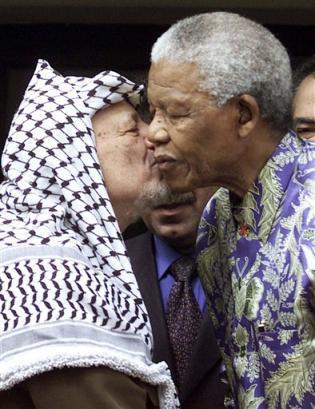
In an astoundingly ambitious new series of 12 feature-length documentaries titled The Price of Kings (available to watch online) the British production company Spirit Level Films challenge the perception of leadership in provocative and imaginative ways. Through a creative counterpoint between historical 'truth' and memory, and supported by powerful archival material, the series thoughtfully and powerfully critiques often intractably difficult political histories. Melding archival footage with interviews with some of the most prominent (and controversial) politicians and activists alive, the series delves into the careers of divisive characters in recent political history, starting with Yasser Arafat.
Here's the trailer:
At the UK premiere a moving introduction from his widow, Suha Arafat, was followed by an impassioned plea from the Palestinian ambassador who perfectly summed up the protracted struggle that the film was to address; he said: 'we are stuck between the historical imperative and the political impossible'. And how does a documentary film deal with this impossibility? In "The Price of Kings," it is achieved through an imaginative, malleable, deeply personal treatment of history.
"The Price of Kings" gently presents its audience with a spectrum of opinion and belief; treating both the deeply emotional and impassioned recollection as equally relevant and truthful as starkly historical 'fact'. The moving testimonies of those who believed in Arafat's pragmatic methods, and who credit him completely for putting Palestine back onto the map — in whatever husk of its former self — is supported brilliantly by archival material from the PLO; a plump-lipped and wide-eyed Arafat as a young freedom fighter slowly transforms into an elder statesman, exhausted by violence, negotiation, and responsibility.
In an accompanying collection of essays, titled 'The Price of Kings: On Leadership', contributors FW De Klerk and Nelson Mandela remind of the relationship between African liberation movements and Arafat's PLO, and the political symmetry between two movements fighting for rights and nationhood.
In 1961, Hendrick Verwoerd, then Prime Minister of the South Africa's racial dictatorship, said:
the Jews took Israel from the Arabs after the Arabs had lived there for a thousand years. Israel, like South Africa, is an apartheid state.
Desmond Tutu, in various newspaper articles and broadcasts, has drawn parallels between modern Israel and the Apartheid regime. For example, in 2010, in an open letter to the University of Berkeley, he clearly explains:
I have been to the Occupied Palestinian Territory, and I have witnessed the racially segregated roads and housing that reminded me so much of the conditions we experienced in South Africa under the racist system of Apartheid. I have witnessed the humiliation of Palestinian men, women, and children made to wait hours at Israeli military checkpoints routinely when trying to make the most basic of trips to visit relatives or attend school or college, and this humiliation is familiar to me and the many black South Africans who were corralled and regularly insulted by the security forces of the Apartheid government.
There is also a more general historical relationship between African liberation movements and the PLO, which makes this complicated yet intriguing film about leadership and the fight for nationhood all the more compelling and far-reaching.
The next instalments of the series are up for negotiation — members of the public can nominate leaders they would like to see investigated in this film series. I'd strongly urge anyone with an interest in African leaders who have been misunderstood or under-represented in film to nominate. You can login in on the website and nominate a leader here. Here's a trailer of the Peres episode:
With 12 more films to go, the series is a bold counter-production to the popular history programmes that deal with conflict either sensationally, or with a dry nervousness. The next two instalments delve into the careers of Shimon Peres, the current president of Israel, and Oscar Arias, Nobel Peace Prize winner and president of Costa Rica from 2006-2010.
As a meditation on the trappings of power, and the sacrifices of political responsibility, The Price of Kings series is promising to be complicated, confusing, but necessarily, enjoyably, and powerfully so.
*A version of this article will appear on Permanent Plastic Helmet

March 22, 2012
Diplo vs Boima Redux
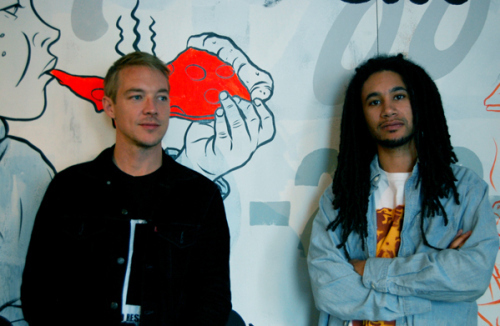
Diplo and Boima, Photo: Okayplayer.
Remember when famed DJ and tastemaker, Diplo, got mad at Africa is a Country's Boima for a post Boima did about global dance music and cultural appropriation? (Click here for the post and scroll down for Diplo's outbursts). Anyway, Okayplayer's Eddie 'Stats' Houghton (check out his Large Up blog btw) got the two to sit down (and even shake hands) recently in New York City. You can read the transcript of the exchange on Okayplayer's blog. It is all very civilized. In related news, Diplo is the subject of a rambling Rolling Stone profile that went up today in which vague reference is made to "critics [who] have accused [Diplo] of hipster imperialism." I hope they weren't talking about Africa is a Country. Anyway, later today (Friday) Boima will join Eddie, Wayne Marshall (of Wayne and Wax) and Venus X Iceberg (it was her twitter 'beef' with Diplo that first prompted Boima's post btw) at New York University for a roundtable discussion at the EMP Museum's 2012 Pop Conference on "Tropical Music, Appropriation and Music "Discovery" in the Global Metropolis." Let's hope there's a tape.

Music Break. Adam Glasser
Via Waldo Muller: "Adam Glasser video shot in the legendary Kohinoor appliances & music store in Market Street, Johannesburg. In the early 2000s, Kohinoor still stocked hundreds of sealed (mint) jazz & soul vinyls, all super cheap. Seems like they still have LPs, I spotted some in the video. Plus a young Miriam Makeba lookalike. Glasser will bring [his] harmonica to the Cape Town International Jazz Festival 2012. It's a piercing sound but uplifting in small dosages."

Tomorrow's Marching Band
In the DRC, city life isn't foremost defined by the image of the child soldier (contrary to what some campaigns would have you believe) but rather by that of the street child. Seen by many as a superfluous presence, a residue or a waste, street children become easy victims of gossip and accusation while at the same time, as a relatively new phenomenon, they are also hard to explain (children weren't always considered as a cause for personal illnesses or used as scapegoats for families falling apart), ultimately becoming and posing something of a danger and a threat that needs to be dealt with and ideally removed from the stuttering and improvisational city logics. The practice of labeling the street child as a witch is complex and has been receiving more and more attention over the years (particularly by foreign academics and journalists), and so have initiatives of individuals and local organizations investing their energy in keeping some of these children away from the street — and the accusations.
The above portrait (dating from 2010) by Dutch photographer Rachel Corner and anthropologist Laurens Nijzink, recorded in Kinshasa, is one such an example. It tells the stories of Dorcas, Christian and Cécile who were taken in by maman Cathy Ekemino and were given the opportunity to play in a brass band.

This is democracy
In Durban, South Africa, "shackdwellers are taking their municipality to court. The government evicted poor residents from their homes … [in order to allow the construction of a road] … and threw them into transit camps, where they live 'like a fish in a tin', waiting for more permanent housing that never comes. [One of the conditions of the eviction order was that the occupiers would be provided with permanent housing within a year. The deadline for doing so expired almost two years ago and nothing has been done to comply with the order.] It's not easy to make the state behave in ways that aren't like a state. But this is shackdweller statecraft" (from Dear Mandela and Raj Patel).

Sean Jacobs's Blog
- Sean Jacobs's profile
- 4 followers


